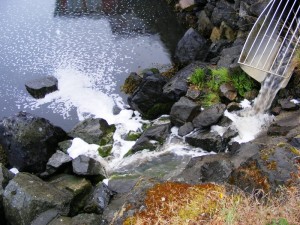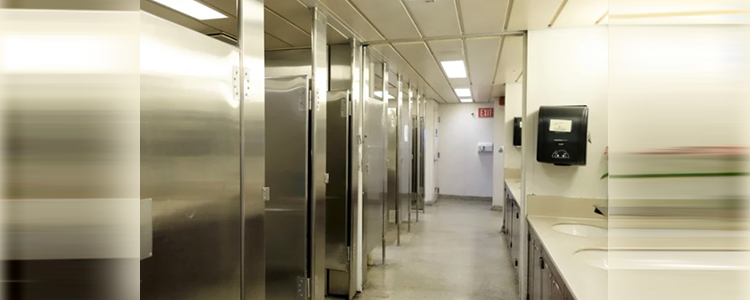By Brian Rader
San Juan County Pollution Prevention Specialist
Spring has sprung. We have enjoyed some great weather and many of us are excited to tackle some of those outdoor projects that seem to stack up during the cooler, wetter months. Before diving in, take a moment and think about how to minimize the problems our activities may create for our neighbors and the environment.
During the last month there have been quite a few damaging chemical spills in San Juan County. Among them:
- White latex paint washwater from a shoreline residential construction site on Orcas was accidentally discharged into a stormwater drain, and into President’s Channel.
- Equipment washing in an alley in Friday Harbor resulted in a discharge of surfactants (detergent) into the harbor.
- Last Tuesday’s (5/18) rainfall resulted in another sudsy water discharge from the stormwater outfall at the base of Spring Street in Friday Harbor.
- On Lopez, an unknown chemical burned several hundred yards of vegetation in ditches in Lopez Village. The trail of dead vegetation indicated that this material washed into the stormwater pipes, likely discharging into marine waters.
- On Orcas, concrete slurry from another shoreline construction operation was spilled at the ferry terminal. Staining indicated that some of this material washed into the storm drain system.
- In Lopez Village, dead vegetation around the downspouts of a commercial building suggests someone may have gotten a bit carried away with moss removal and prevention chemicals. The pattern of dead vegetation indicated that this material likely washed into the storm drain, which discharges into the sea.
Incidents like these can be easily avoided by taking extra care when handling chemicals outside. Take a moment and think about where your fuel or paint or other chemicals might go if you are unlucky enough to have a spill (we have all been there). Liquid waste is going to flow downhill, and we all know where downhill ends… in our drinking water supply and/or into the sea. Here are some tips:
- Assume that every stormwater catch basin (metal grates in streets & parking lots) delivers runoff water, untreated, to the sea.
- Plan for spills. Have spill clean up materials, like oil soaker pads and granular absorbents, on hand at your home and business and learn how to use them. Drips and leaks add up over time. Clean up your spills so they don’t become a problem for neighbors or wildlife.
- Be very careful washing out LATEX paint brushes. Those of us on septic systems are left with few options other than washing them out on the ground. Make sure the wastewater is contained and does not run off into ditches, storm drains, or other surface water bodies. Also, make sure that you are not cleaning out your brushes on top of (and therefore into) a subsurface drain system.
- Oil-based paints, oil-based stains and solvents are hazardous chemicals and should never be disposed of onto the ground. Brushes and rollers should be cleaned inside containers and the resulting waste should be safely stored for proper disposal at the next hazardous waste round-up collection event. Also, paint thinner can be decanted and re-used after the paint residue settles.
- Store chemicals, including fuels, inside with tight fitting lids to prevent spills. At the very least these need to be stored under cover and protected from runoff water.
- Use extra caution when storing chemicals. Secondary containment, placing liquid chemicals inside larger containers to contain leaks and spills, can be used to provide protection against accidental groundwater contamination. This is a good idea for fuel storage, too.
- Anticipate leaks and spills and plan how to react.
- Always look downhill.
- Think through your actions.
- Use care.
Brian Rader can be contacted at San Juan County offices at 135 Rhone Street in Friday Harbor, PO Box 947 Friday Harbor, WA 98250, at 360-370-7581, brianr@sanjuanco.com or at the website: https://www.sanjuanco.com/pollutionprevention/
**If you are reading theOrcasonian for free, thank your fellow islanders. If you would like to support theOrcasonian CLICK HERE to set your modestly-priced, voluntary subscription. Otherwise, no worries; we’re happy to share with you.**









It is great to see that there is a group of concerned citizens identifying pollution and offering information about limiting the effects of chemical usage. When it comes to paint and other household and construction chemicals, in addition to minimizing local pollution, sending the really horrible stuff off island to be contained and disposed of, refined and burned, etc., for the person who is going to use up that last can of paint no matter what, why not also and primarily suggest to the environment friendly reader that they simply stop using latex and oil paints now. There are at least 3 brands of Zero VOC, all natural paints and finishes. There are laundry soaps that really work that contain no detergents. There just is no justification for poisoning the islands/the sound/landfills ever again on account of needing to paint or clean something. It is shortsighted to only suggest that everybody can feel good about continuing to use the really bad stuff in a safer way or to consider latex a safe substance if it is properly handled. It is not. The primary message should be to stop using the herbicidal roof treatments, stop using Round up, stop using oil and latex paints, stop using detergents and ban them from public use like leaded gas and asbestos brake pads. If you feel compelled to use up what you have left, then list the tips for the safest way to minimize the impact of its use and follow up with information on how to keep from using it ever again.